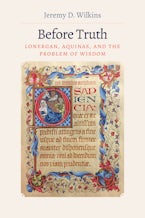- Home
- religion
- philosophy
- Before Truth
Preparing your PDF for download...
There was a problem with your download, please contact the server administrator.
Before Truth
Lonergan, Aquinas, and the Problem of Wisdom
Imprint: Catholic University of America Press
It’s frequently said that we live in a "post-truth" age. That obviously can’t be true, but it does name a real problem on our hands. Getting things right is hard, especially if they’re complicated. It takes preparation, diligence, and honesty. Wisdom, according to Thomas Aquinas, is the quality of right judgment. This book is about the problem of becoming wise, the problem "before truth." It is about that problem particularly as it comes up for religious, philosophical, and theological truth claims.
Before Truth: Lonergan, Aquinas, and the Problem of Wisdom proposes that Bernard Lonergan’s approach to these problems can help us become wise. One of the special problems facing Christian believers today is our awareness of how much our tradition has developed. This development has occurred along a path shot through with contingencies. Theologians have to be able to articulate how and why doctrines, institutions, and practices that have developed—and are still developing—should nevertheless be worthy of our assent and devotion.
What is happening when doctrine is developing? How do we relate the truth of the New Testament to the dogmas formulated by the Councils? In what sense is a theological theory "true"? Can we still do metaphysics—the science of "being as being"—even though we do not know all of being? How can we distinguish true and false developments in our religious tradition, in philosophy, or in theology? On what basis should we accept Jesus Christ as the supreme teacher of wisdom?
Part One explores Lonergan’s apprenticeship to Thomas Aquinas, and the influence of that apprenticeship on Lonergan, his distinctive approach to philosophy and the method of theology. Part Two shows how Lonergan tried to implement his ideas by taking soundings in his theology. Jeremy Wilkins looks at his analysis of the development of Trinitarian doctrine, his appreciation for Thomas Aquinas’s theory of the Trinity, and his account of the human wisdom of Christ, the supreme teacher.
Jeremy D. Wilkins is associate professor of theology at Boston College and editor of two volumes of Bernard Lonergan's collected works.
"Jeremy Wilkins provides a detailed and reliable examination of the thought of Aquinas and Lonergan, as well as some historical context, criticism, and evaluation of their contributions. It makes a tremendous contribution to systematic theology, will immediately become a must-read for Aquinas and Lonergan scholars, and will remain an important book for many years to come. -"
~Mark Miller, author of The Quest for God and the Good Life: Lonergan's Theological Anthropology (CUA Press)
"The most important book on Lonergan in recent decades, a work that has all the characteristics of becoming the standard interpretation of Lonergan's thought for the next generation."
~Thomist

